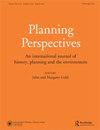从RPAA到RDCA——社区主义区域主义是一个始终如一的主题
IF 0.9
3区 历史学
0 ARCHITECTURE
引用次数: 0
摘要
摘要美国区域规划协会(RPAA)在1923年至1933年的十年倡导和实施过程中,由一个城市化、设计、经济、住房和规划方面的核心专家小组组成。25年后的1948年,为了纪念霍华德的《明日》50周年,成立了一个鲜为人知的后续组织——美国区域发展委员会(RDCA)。为应对战后的发展激增,RDCA雄心勃勃的议程从联邦规划到城市更新,再到“生产性防御”的社区建设。本研究对档案材料进行了比较分析,包括审查在两个组织都不活跃的过渡期内维持RPAA任务的努力。虽然RDCA只运作了四年,但核心成员一直主张将地区城市作为战后联邦、州和地方层面广泛挑战的解决方案。在这样做的过程中,他们的战略涉及规划的专业化和制度化程度的提高。与此同时,他们对社群主义区域主义的持续关注与通过主导该领域的扩张主义对经济发展的日益重视有所不同。本文章由计算机程序翻译,如有差异,请以英文原文为准。
From the RPAA to the RDCA – communitarian regionalism as a consistent theme
ABSTRACT The Regional Planning Association of America (RPAA) comprised a core group of experts on urbanism, design, economics, housing, and planning throughout its ten years of advocacy and implementation from 1923 to 1933. A lesser-known subsequent organization, the Regional Development Council of America (RDCA), was founded twenty-five years later in 1948 in recognition of the 50th anniversary of Howard’s To-morrow. Primed for a postwar development surge, the RDCA’s ambitious agenda ranged from federal planning to urban renewal to community building for ‘productive defense’. This study applies a comparative analysis of archival materials, including review of efforts to sustain the RPAA mission during the bridging period when neither organization was active. While the RDCA only functioned for four years, the core membership consistently advocated for the regional city as the solution to a wide range of postwar challenges at the federal, state, and local levels. In doing so, their strategies addressed the increased professionalization and institutionalization of planning. At the same time, their sustained focus on communitarian regionalism diverged from the growing emphasis on economic development through expansionism that came to dominate the field.
求助全文
通过发布文献求助,成功后即可免费获取论文全文。
去求助
来源期刊

Planning Perspectives
Multiple-
CiteScore
1.50
自引率
12.50%
发文量
85
期刊介绍:
Planning Perspectives is a peer-reviewed international journal of history, planning and the environment, publishing historical and prospective articles on many aspects of plan making and implementation. Subjects covered link the interest of those working in economic, social and political history, historical geography and historical sociology with those in the applied fields of public health, housing construction, architecture and town planning. The Journal has a substantial book review section, covering UK, North American and European literature.
 求助内容:
求助内容: 应助结果提醒方式:
应助结果提醒方式:


